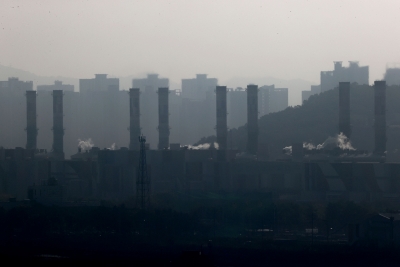S. Korea's new emission reduction target poses both risks, opportunities for firms
By IANS | Updated: November 11, 2025 09:35 IST2025-11-11T09:32:51+5:302025-11-11T09:35:06+5:30
Seoul, Nov 11 South Korea's new carbon reduction target unveiled this week is expected to pose challenges for ...

S. Korea's new emission reduction target poses both risks, opportunities for firms
Seoul, Nov 11 South Korea's new carbon reduction target unveiled this week is expected to pose challenges for local businesses amid lingering global economic uncertainties, while at the same time offering an opportunity for a full-fledged green transition that will pay off in the long run, experts said on Tuesday.
On Monday, the Presidential Commission on Carbon Neutrality and Green Growth said it approved a goal to reduce South Korea's greenhouse gas emissions by 53-61 percent from 2018 levels by 2035.
The nationally determined contribution (NDC) target, endorsed at a Cabinet meeting on Tuesday, will be officially unveiled at the 30th United Nations Climate Change Conference (COP30) in Belem, Brazil, which began Monday and will run through Nov. 21, reports Yonhap news agency.
The business community fears the carbon reduction plan may deal a harsh blow to key industries, including automobiles, steel, petrochemicals and cement, as they will face higher financial burdens in building carbon reduction facilities and purchasing emission credits.
"While adjusting to changes in the global economic environment, including U.S. tariff policies, has become an urgent issue, setting the reduction target at 53 to 61 percent by 2035 will pose a significant burden for companies," a group of 14 business lobbies said in a joint statement.
The business organisations noted that relevant reduction technologies have not yet been fully commercialised, urging the government to introduce additional support measures for companies, such as refraining from raising electricity rates.
Experts echoed the view, noting that under the current state of the industries, implementation of the new emission policy could push companies to relocate their production lines overseas or even shut down operations.
Yoo Seung-hoon, a professor of energy policy at Seoul National University of Science and Technology, said the NDC target will inevitably lead to a major setback for industries, stressing that business officials would have felt a sense of "panic" following the announcement.
"Local businesses will have no choice but to reduce domestic production or relocate their manufacturing lines overseas," Yoo told Yonhap News Agency when asked about the impact of the NDC target on South Korean industries.
"For example, the steel industry needs to utilize hydrogen during the production process to meet the target, but it will cost more, and securing the gas remains a challenge," the energy professor said.
Disclaimer: This post has been auto-published from an agency feed without any modifications to the text and has not been reviewed by an editor
Open in app